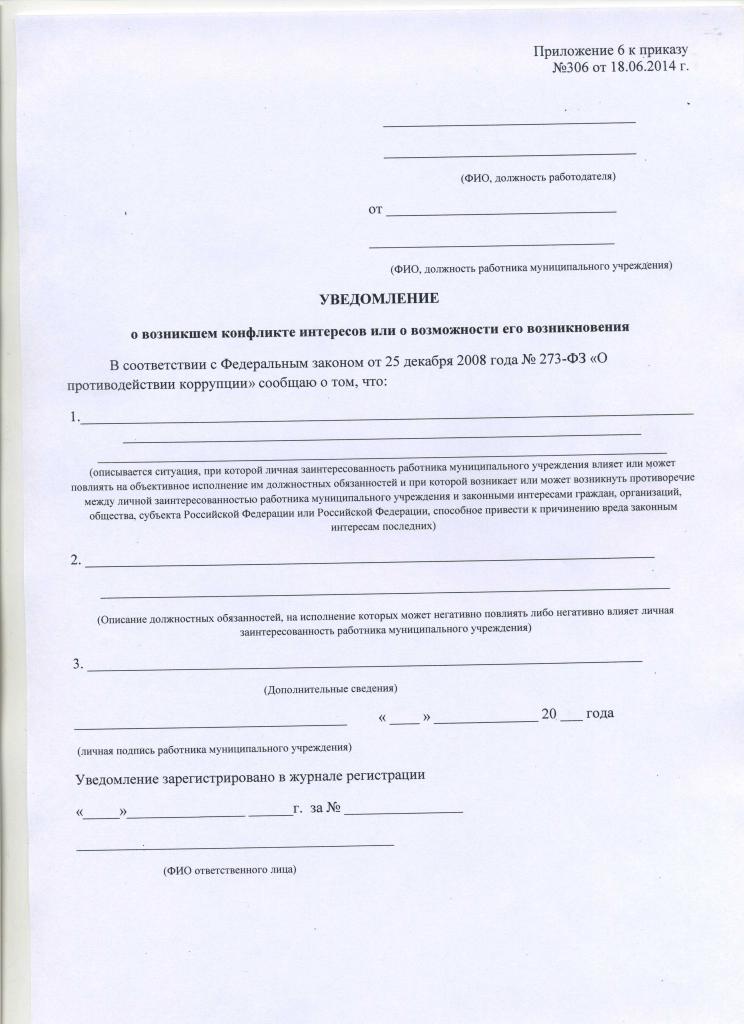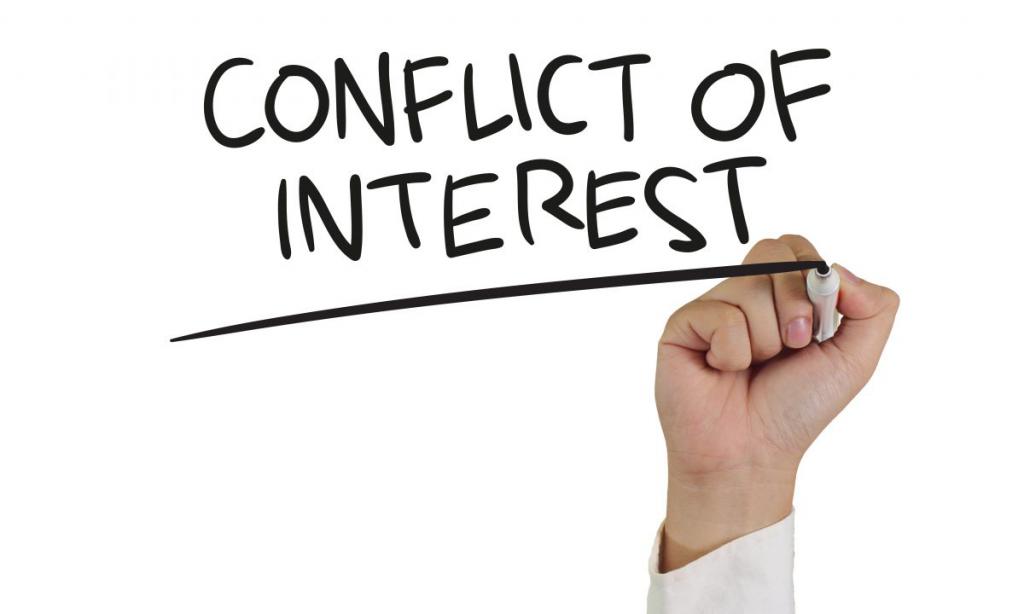A conflict of interest sometimes lies literally on the surface and is clearly visible to others. Nevertheless, the most serious problems arise in cases where such a phenomenon is externally imperceptible. If it is not detected in time, then in the end it can greatly damage the reputation of a person or organization.
There are many examples of conflicts of interest from life. For example, a man is the boss, and his son works as his assistant. And even if the latter will brilliantly cope with their work, people will never objectively evaluate this situation.

What is a conflict of interest and how can it be detected? Let’s try to understand this issue using specific examples.
Distribution area
Conflict of interest is a ubiquitous phenomenon. Similar situations can occur in any area of life. Examples of conflicts of interest are often found between family members and classmates, among staff members of the same organization, as well as in communities created by like-minded people. Moreover, their presence does not mean that people have a personal dislike for each other. The most complex areas in which there is a conflict of interest are the political and national sectors.
Definition of a concept
A similar phenomenon occurs in our life quite often. It is simply impossible to conceal a conflict of interest or quickly exhaust it. That is why a federal law has appeared in Russia, which is called "On Combating Corruption." This document interprets the concept of “conflict of interest” as a situation in which there is an indirect or direct personal interest of a municipal or public servant. At the same time, she is capable of exerting or is already exerting influence on the performance of his official duties. As a rule, examples of conflicts of interest in the state and civil service relate to obtaining material benefits for employees not only for themselves, but also for those third parties with whom there is a connection in the form of financial obligations.

In a 2009 report, Marilyn Field and Bernard Law pointed out that a conflict of interest was nothing more than a combination of obligations that created risks that a secondary interest would have a direct impact on professional actions or judgments regarding primary interests. In other words, such a phenomenon can take place in the case of the personal gain of a person who is involved in the adoption of a decision. This leads to damage to the interests of the company or society.
Consider some illustrative examples of conflicts of interest:
- A pharmaceutical company hands over a research grant to a doctor. In this case, the specialist begins to feel obligated to prescribe the drugs of this particular manufacturer to his patients, despite the availability of better alternatives. In this case, damage to the public interest.
- A woman who is an employee of the company, describes the boss the dignity of his nephew as a candidate for a vacant position. However, she does not mention her family ties with him.
- The boss gives the employee the task of finding a supplier for the company. He offers in response an organization whose shares are owned by himself.
- At the end of the year, the boss issues impressive bonuses to himself and his team. Moreover, this happens against the background of the fact that the owners of the company have serious losses.
In most cases, such situations are not against the law.That is why in any organization there are so many examples of conflicts of interest. But the existing problem will certainly cast doubt on the employee’s reputation, reliability and honesty. In the future, this will negatively affect the work of the entire team.
Signs and forms
The word "conflict" came to us from Latin. Translated from this language, it means nothing more than “collision”. That is, a certain moment comes when two or more members of a community or group begin to make claims on the same object. This leads to the intersection of areas of interest of all those related to this situation.

Conflict of interest is divided into personal and organizational. In the first case, the performance of official duties by a person comes into apparent conflict with his own desires. Examples in the service of a conflict of interest sometimes relate, for example, to a situation where, despite the fact that the task will not be completed on time, the employee seeks to leave home either at the end of the working day or earlier. Indeed, for the evening he has his own plans.
In the event of an organizational conflict, a whole private enterprise stands up for its own benefit. In this case, the company takes into account only its interests and tries to refuse or refuses to cooperate with the state, becoming unable to render its services impartially. Responsibility for such a situation rests entirely with the head, because such acts will certainly cause damage to the company as a whole. If the damage is inflicted on structures that are under state support, then in this case the entry into force of the current legislation is possible.
Similar situations arise in those cases when the object of the conflict cannot be divided between the two parties claiming it. Moreover, no one wants to make concessions or seek compromises.
Conflict Resolution
Article number 11 of the federal law providing for the fight against corruption distinguishes two subjects of settlement, as well as preventing conflicts of interest. One of them is a municipal (state) employee. The second subject is the representative of the employer.
Municipal and civil servants in this regard are endowed, according to the law, with two main responsibilities. First of all, they need to take measures to prevent any situations in which the occurrence of a negative phenomenon is possible. In addition, they should write a notice of conflict of interest, an example of which will be given below, to their immediate superior. Such a document should indicate not only the situation that already exists, but also the possibility of its occurrence. Moreover, the civil servant is obliged to take such a step already when he becomes aware of this.
In order to prevent a conflict of interests, this representative of the government should not maintain contacts with organizations whose activities are in the field intersecting with his official duties. This does not apply to cases where he is obliged to perform such work.
As for the written notification of a potential conflict of interest, the degree of personal benefit of the employee, according to the current legislation, should be determined only by the official. Failure to take measures to resolve such a problem entails his dismissal.
Notification Sample
How, then, should a public servant prevent the possibility of a personal plan problem arising from a particular issue? To do this, he will need to write a notice of conflict of interest, an example of which can be found below.

The document must be drawn up in the name of the head. This is followed by its name: “Conflict of Interest Notice.”The text of the document indicates the last name, first name and patronymic of the civil servant, as well as his position. After this, a situation is described that provokes the likelihood that a conflict of interest is possible. For example, it may relate to the organization signing contracts with a supplier company, which is headed by a close relative of the official. What follows is the employee’s consent or disagreement to be present during a meeting of the commission set up to resolve this conflict of interest. At the bottom of the notice is the signature of the person who wrote it, as well as his F. I. O. and the date of the document.
Consider typical situations and examples of conflicts of interest in the public service of Russia.
Relations with relatives
There are examples and situations of conflict of interest in the public service in the event that there is a personal benefit for the official. So, an employee can take a direct part in resolving personnel issues regarding his relatives. In addition to loved ones, here you can consider other persons in respect of whom the public servant is likely to receive benefits. Consider examples of conflicts of interest in the municipal service:
- An employee of a state body is a member of a competitive commission considering candidates for occupying a vacant position in his institution. One of the applicants is his relative.
- The duties of a civil servant include the implementation of certain managerial functions or the adoption of personnel decisions regarding relatives or other persons close to him.
- In such cases, it is mandatory to write a notice of the likelihood of a conflict of interest. In this regard, the representative of the employer must remove such an employee from those duties that involve his interaction with loved ones.
Other work payable
An example of a conflict of interest in the public service is a situation when an official, as well as his relatives or other persons close to him, are going to do or are already doing work for the organization where this employee works under the terms of a civil or other contract.

In this case, a notice of the existence of a conflict of interest should also be drawn up. But at the same time, the representative of the employer does not have the right to indicate the impossibility of performing other work by this official.
An example of a conflict of interest in the public service is also a situation where an employee, together with his relatives or other persons with whom profitable interaction is carried out, performs work in a subsidiary, parent or other similar company, in respect of which these employees carry out managerial functions.
And in this case, the representative of the employer must be notified. In it, the civil servant should indicate the relations that exist between the interacting organizations. The representative of the employer, according to the norms of the law, is recommended to remove the employee from fulfilling his duties in making managerial decisions regarding the affiliated company.
An example of a conflict of interest in the civil service can be seen in a slightly different situation. It relates to the performance of work, the customer of which is the body in which the person replaces the position. The representative of the employer in this case must indicate a conflict of interest. If a person does not take any measures to eliminate the problem, then he should be removed from his post.
Ownership of certain securities
Consider other cases of conflict of interest.Examples in the service of state or municipal bodies may relate to the possession by an employee or (and) his relatives of securities belonging to this organization. This should also be written in writing. Securities in this case must be transferred to trust. In addition, the question of their alienation may be considered.
Examples of conflicts of interest may also apply to situations in which a public servant has deposits with banks or other credit organizations in respect of which he carries out managerial functions. In this case, you will also need to write a notice of personal interest in the name of your immediate superior. Prior to taking the necessary measures, the employee must be suspended from the performance of those official duties that relate to work with banks and credit organizations.
Receiving services and gifts
A situation is also possible when a civil servant or his relatives receive various benefits. It can be discounts and loans, free services, payment of travel expenses, entertainment, etc.

Such gifts, if provided by organizations or individuals in respect of which a public servant currently exercises or has previously performed managerial functions, are subject to a growing conflict of interest. To avoid this situation, it is recommended simply not to accept these benefits. If the representative of the employer became aware of the receipt of gifts by civil servants, then he must evaluate the connection received with the performance of the duties assigned to the employee, and if necessary, take disciplinary measures.
The sphere of education
In addition to public service, examples of conflicts of interest can be given in schools. This applies to situations where the teacher in parallel with the implementation of his labor activities provides paid services.
The legislator seeks to deal with such a situation when the teacher is engaged with a student who is studying at the school, which is the place of work of this teacher. As a result of such actions, a conflict of interest arises in education. Examples of the provision of such paid services can be found everywhere. At the same time, some teachers artificially create situations in which parents of children or their legal representatives are forced to agree to the provision of tutoring imposed on them. Sometimes colleagues “deliver” each other such students. At the same time, they use the principle "you are to me, and I am to you."

It should be understood that the law does not prohibit the provision of educational paid services. They can be provided by the school on a contractual basis. In this case, the teacher who conducts the usual lesson in the child, according to the curriculum, may well provide paid services. That is, legally, this can only be done as a representative of the contractor when concluding contractual obligations.
In what cases do the services provided by the teacher violate the norms of the current legislation? This happens when the following conditions are met:
- the service provided by the teacher is informal and is paid;
- the student is studying in the educational organization where the tutor works;
- the provision of paid services becomes a cause of a conflict of interest for the teacher.
Subject to all the above conditions, additional training does not meet the requirements of the law and is prohibited. This also applies to those cases when the teacher does not conduct lessons with a particular student. Indeed, in this case it is impossible to prove the fact of the absence of collusion among pedagogical workers.
The conflict of interests in the field of education lies in the contradiction that arises between professional duties and personal gain of a person.After arriving at school, the teacher is faced with the possibility of acquiring tangible or intangible benefits. This is the reason for his non-fulfillment of professional duties or their improper performance.
